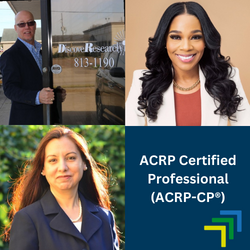When the ACRP Certified Professional (ACRP-CP®) certification launched in 2017, it made available to the clinical research field a rigorously developed and validated test leading to a credential highlighting the skills of professionals whose job roles do not easily stay within the boundaries of traditional clinical research coordinators (CRCs), clinical research associates (CRAs), or principal investigators.
Since then, more than 1,800 persons from all levels of experience in the profession have added the ACRP-CP designation to their signatures—alone or in tandem with other ACRP certifications. This blog begins a year-long series of visitations with some of the personalities behind all that “alphabet soup” of degrees and credentials one sees so often in the clinical research enterprise, in order to celebrate hard-earned achievements and highlight the benefits of certification to all stakeholders in the often-overlooked world of clinical trials.
One person who had her eyes opened to clinical research not so long ago is Javanese Ling, SLPD, CCC, ACRP-CP, now a site manager and CRA with a major pharmaceutical firm. Still relatively new to the industry, she had earlier worked as a medical speech-language pathologist and as a teacher of neuroscience courses. Having already become involved with the Black Women in Clinical Research organization, her attention was turned even more toward the profession when she attended the ACRP 2023 conference in Dallas, Texas.
“I found myself deeply inspired by clinical research professionals with whom I had the chance to network, as well as the wealth of learning opportunities available,” Ling says. “Through engaging with colleagues, I gained insights into their experiences with certification and the potential benefits it offers. I was inspired to pursue certification as a way to enhance my professional expertise and stay current in the rapidly evolving field. I believe that obtaining certification through ACRP, as I did last September, will not only validate my skills, but also contribute to the overall improvement and credibility of the clinical research community.”
One of the earliest professionals to earn the ACRP-CP designation echoes those sentiments. Susmita Mullick, MS, ACRP-CP, President of the ACRP New Jersey Chapter, says, “ACRP certification is recognized as a reputable and respectable program in the research industry. The certification program is well designed for clinical researchers who want to learn more about the intricacies of clinical trial operations, leverage the usage of ethical principles in human research, and implement robust methodology in trial designs. ACRP certification has paved the way for many opportunities and provided me with the strong foundation and confidence needed to work in clinical research.”
Having started her career as a CRC at the site level before moving into a project manager role in a large pharmaceutical company, Mullick gained experience across a wide range of clinical operations duties for different therapeutic areas in just five years. Given the many complexities of the duties that might come her way on any given day, “I do recommend certification, as preparing to first earn it, and then to maintain it, provides valuable insights for streamlining trial processes, making more efficient use of technology platforms to generate quality data, and improving inspection readiness with performance metrics,” Mullick adds.
Long-term professionals in the field have also seen the value of gaining the ACRP-CP designation. As the owner/employee of a site founded in 1999, and someone who has been in the industry since 1988, Matthew Bullock, ACRP-CP, President and Director of Operations for DiscoveResearch, Inc., became a CRC straight out of college, and held ACRP’s CCRC and CCRA certifications in earlier days of his career when they were the right options for him.
“I was motivated by the credibility that certification provides for roles that were otherwise not recognized with a credential through my college degree and/or work experience alone in this field,” Bullock says. “To me, ACRP demonstrated the highest standards for certification offering the credentialing I was seeking.”
As site owner, Bullock adds that he was not expecting workplace recognition/benefits from being ACRP certified. “However, I did (and still do) utilize ACRP certification to market myself for pursuing work and advancing my career in this field,” he notes. “I recommend ACRP certification for others, as well. Even after encouraging seasoned employees of mine to pursue ACRP certification for many years before some of them actually took the initiative, I was persistent and financially supported their ACRP memberships, certification fees, and maintenance fees, and that led to ACRP certification being obtained by some of these individuals.”
Ling notes that she has experienced “significant workplace recognition and benefits” since becoming certified, and has joined ACRP’s Job Analysis Committee as a volunteer. “Certification has not only elevated my professional expertise and credibility in the field, but has also opened the door to new opportunities and increased responsibilities within my company. Furthermore, my company’s acknowledgment of the importance of certification and provision of expense reimbursement demonstrate its commitment to supporting continuous learning and the growth and development of its employees. I highly recommend certification for others in similar positions.”
Obtaining certification not only validates one’s expertise, but also demonstrates a commitment to professional development and staying abreast of industry standards, Ling explains. “It can enhance credibility, open up new opportunities, and contribute to the continuous improvement of the field,” she says. “Certification serves as a valuable investment in both personal and career growth.”
Edited by Gary Cramer



